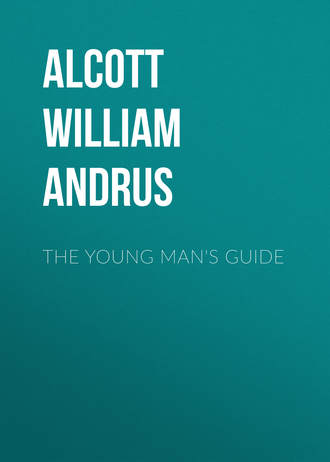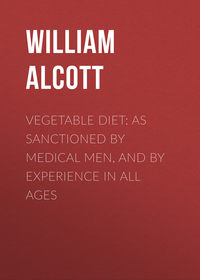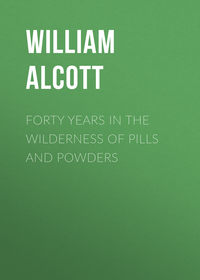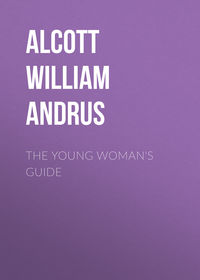
The Young Man's Guide
11
Some of the topics of this section have been anticipated, in part, in a previous chapter; but their importance entitles them to a farther consideration.
12
I know this principle is sometimes disputed. A late English writer, in a Treatise on Happiness, at page 251 of Vol. II, maintains the contrary. He quotes from Lord Bacon, that 'Unmarried men are the best friends, best masters, and best servants,' and that 'The best works, and of greatest merit for the public, have proceeded from unmarried or childless men.' He also introduces Jeremy Taylor, as saying that 'Celibacy, like a fly in the heart of an apple, dwells in perpetual sweetness.'
In commenting upon these remarks, this writer says, 'One half of the most eminent persons that have ever lived in the world of science and literature, have remained unmarried,' and 'in the connubial state, too frequently, the sympathies are connected within the family circle, while there is little generosity or philanthropy beyond.' And lastly, that 'Unmarried men possess many natural excellences, which if not engrossed by a family will be directed towards their fellow creatures.'
Now it is admitted that many eminent men, especially in science and literature, have been bachelors; and that among them were Newton and Locke. But this only proves that while thousands and tens of thousands of their fellow beings spent their lives in insignificance, for want of a definite object to live for, these men, having an object before them, accomplished something. And if you could induce one single man in a thousand, nay, one in ten thousand, to make a similar use of his exemption from the cares of a family, much might be expected from celibacy; or at least, the results of their labors might be a partial compensation to society for the evil tendency of their example. For marriage cannot be denied to be an institution of God, and indispensable to the existence of society. And who can say that he has purchased an indulgence to disobey a law which is in some respects paramount to every other, however great the price he may have paid?
That marriage tends to concentrate our sympathies within the family circle, I do not believe. A proper investigation of the subject will, I am certain, prove this assumption unfounded. Facts do not show unmarried men to be 'best friends, masters, servants' &c.; and I am sorry to find such a theory maintained by any sensible writer. Some of the illustrious examples of celibacy which are usually brought, were by no means estimable for their social feelings or habits. What would become of mankind, if they were all to immure themselves in dungeons, or what is nearly the same thing to social life, among books and papers? Better, by far, to remain in ignorance of the material laws which govern the universe, than to become recluses in a world like this. Better even dispense with some of the lights which genius has struck out to enable us to read suns and stars, than to understand attraction in the material world, while we are insensible to all attractions of a moral and social kind. God has made us to feel, to sympathize, and to love,–as well as to know.
13
It is worthy of remark, as a well established fact, that the Chinese have an Isan-mon or mother, to their silkworms! Her duty is, not to attend to the eggs and the hatching, for nature has made provision for that; but to take possession of the chamber where the young are deposited; to see that it be free from 'noisome smells, and all noises;' to attend to its temperature, and to 'avoid making a smoke, or raising a dust.' She must not enter the room till she is perfectly clean in person and dress, and must be clothed in a very plain habit; and in order to be more sensible to the temperature of the place, her dress must contain no lining.
Now although every mother of children does not have the care of silkworms, yet she has the care of beings who are in some respects equally susceptible. And I trust no person who knows the importance of temperature, ventilation, &c. especially to the tender infant, will be ashamed to derive an important lesson from the foregoing.
14
Parents who inform their children on this subject, generally begin too late. Familiar conversational explanation, begun as soon as there is reason to apprehend danger, and judiciously pursued, is perhaps the most successful method of preventing evil.
15
Pronounced entaunders.
16
What inadequate ideas are sometimes entertained by young professors of religion, and even by those more advanced, in regard to the purity of character which is indispensable to the enjoyment of a world of bliss–a world whose very source, sum, end and essence, are Infinite Purity itself!
Since the first edition of this work was published, I have received several letters of thanks for having ventured upon this long neglected, but important subject. Teachers, especially, have acknowledged their obligations, both in person and by correspondence. One teacher, in particular, a man of considerable experience, writes as follows:–
'The last chapter of the book, is by no means, in my view, the least important. I regret to say that many religious young men, through ignorance, are attached to the last mentioned vice. I could wish that what you have written could be carefully read by every young man, at least, in our land. Alas, dear sir, how little do mortals know, when they do not understand their physical structure!'





